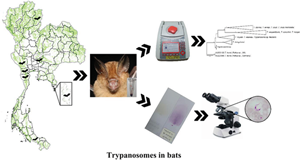Published online by Cambridge University Press: 04 February 2022

The vast majority of trypanosome species is vector-borne parasites, with some of them being medically and veterinary important (such as Trypanosoma cruzi and Trypanosoma brucei) and capable of causing serious illness in vertebrate hosts. The discovery of trypanosomes in bats emphasizes the importance of bats as an important reservoir. Interestingly, there is a hypothesis that bats are ancestral hosts of T. cruzi. Trypanosome diversity has never been investigated in bats in Thailand, despite being in a biodiversity hot spot. To gain a better understanding of the diversity and evolutionary relationship of trypanosomes, polymerase chain reaction-based surveys were carried out from 2018 to 2020 in 17 sites. A total of 576 bats were captured, representing 23 species. A total of 38 (6.6%) positive samples was detected in ten bat species. Trypanosoma dionisii and Trypanosoma noyesi were identified from Myotis siligorensis and Megaderma spasma, respectively. The remaining 18S rRNA sequences of trypanosomes were related to other trypanosomes previously reported elsewhere. The sequences in the current study showed nucleotide identity as low as 90.74% compared to those of trypanosomes in the GenBank database, indicating the possibility of new species. All bat trypanosomes identified in the current study fall within the T. cruzi clade. The current study adds to evidence linking T. noyesi to a bat trypanosome and further supports the bat host origin of the T. cruzi clade. To the best of authors' knowledge, this is the first study on bat trypanosomes in Thailand and their phylogenetic relationships with global isolates.